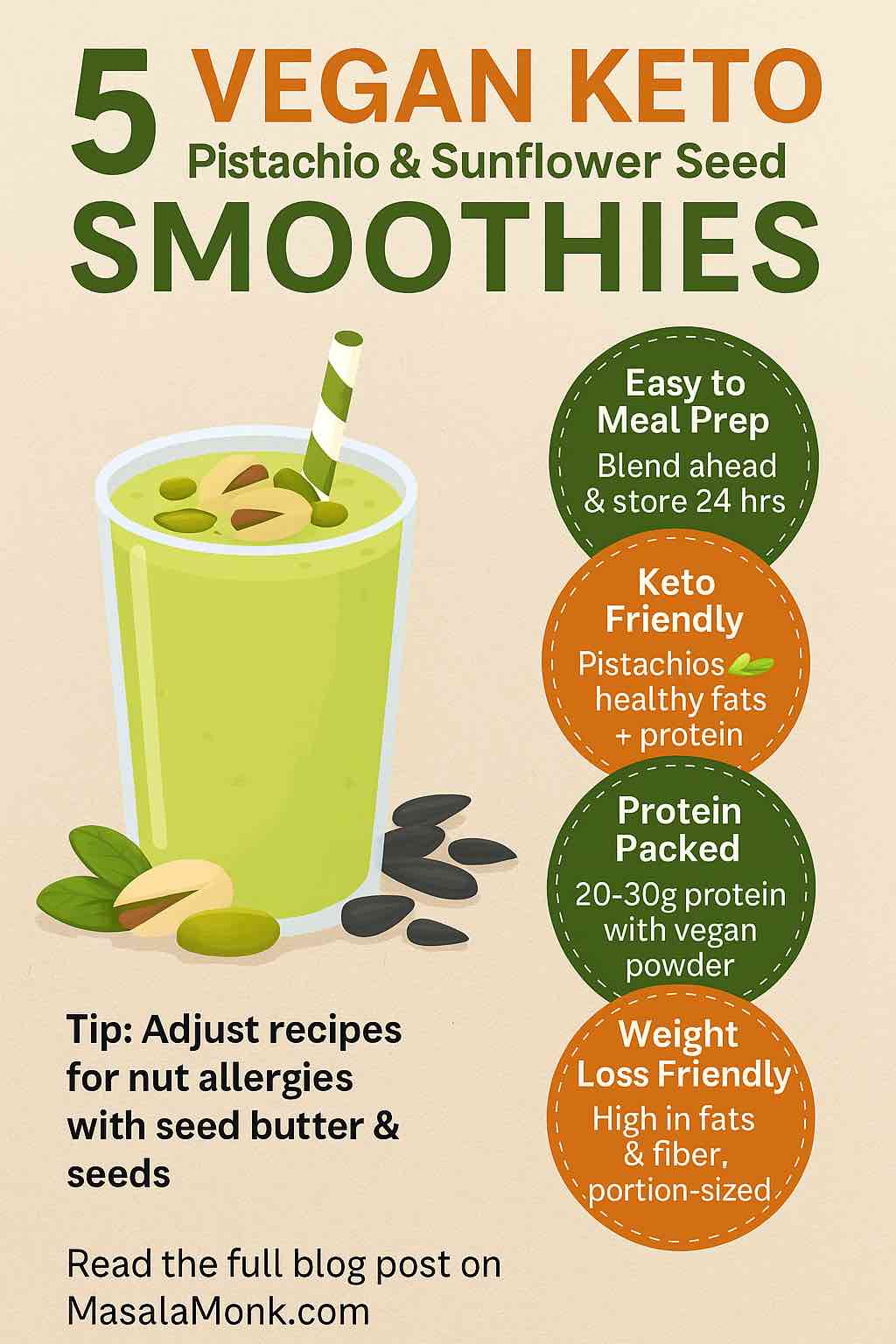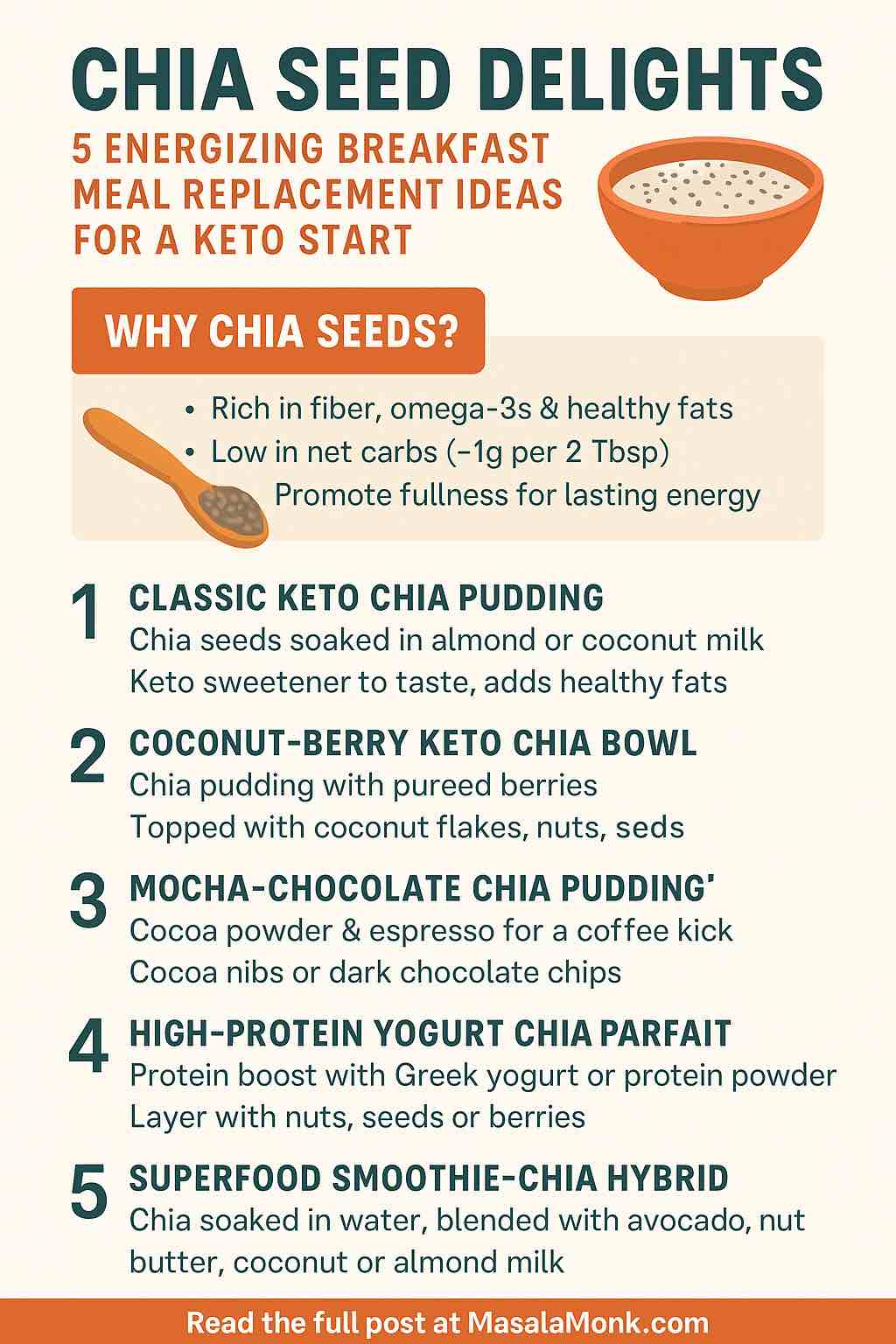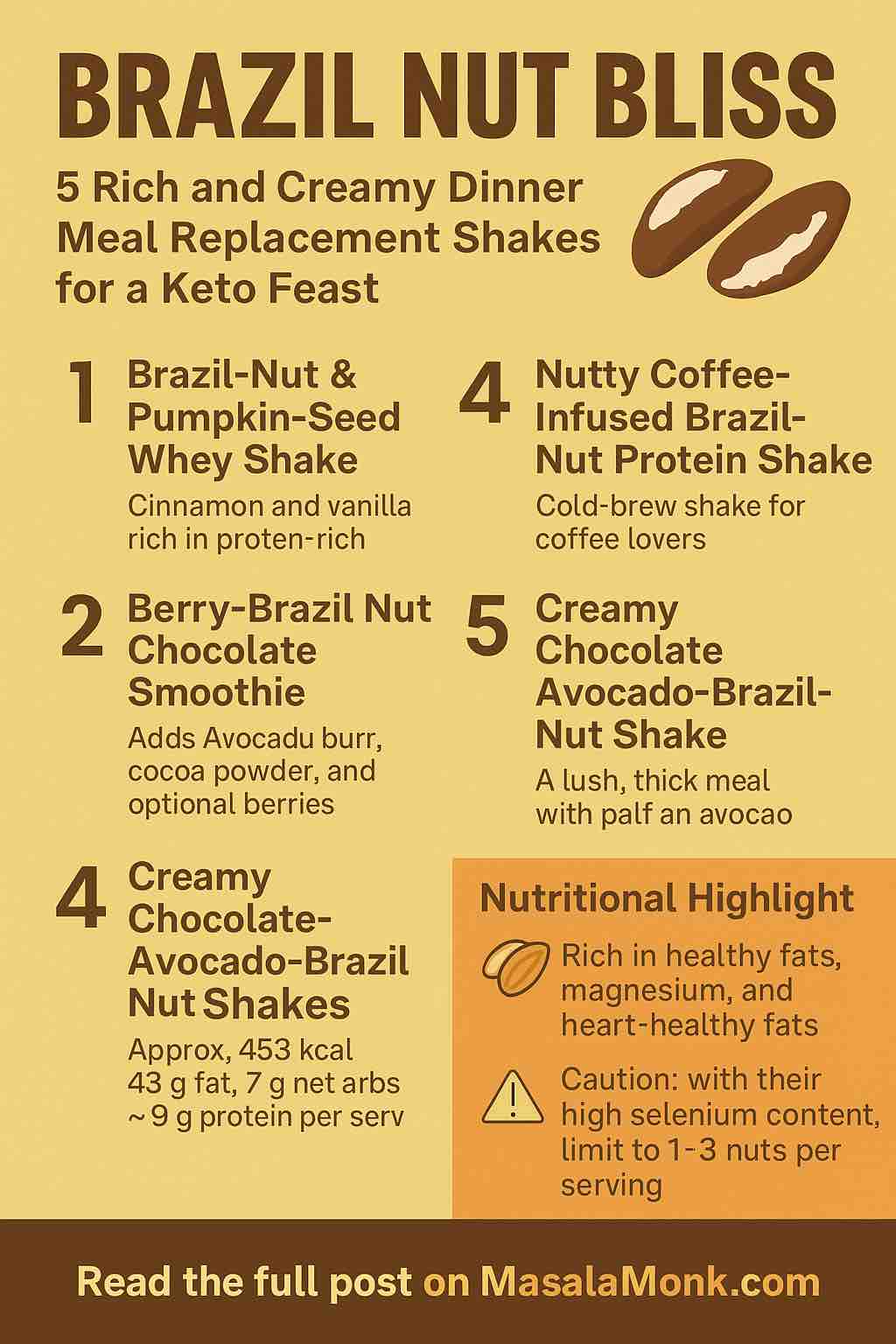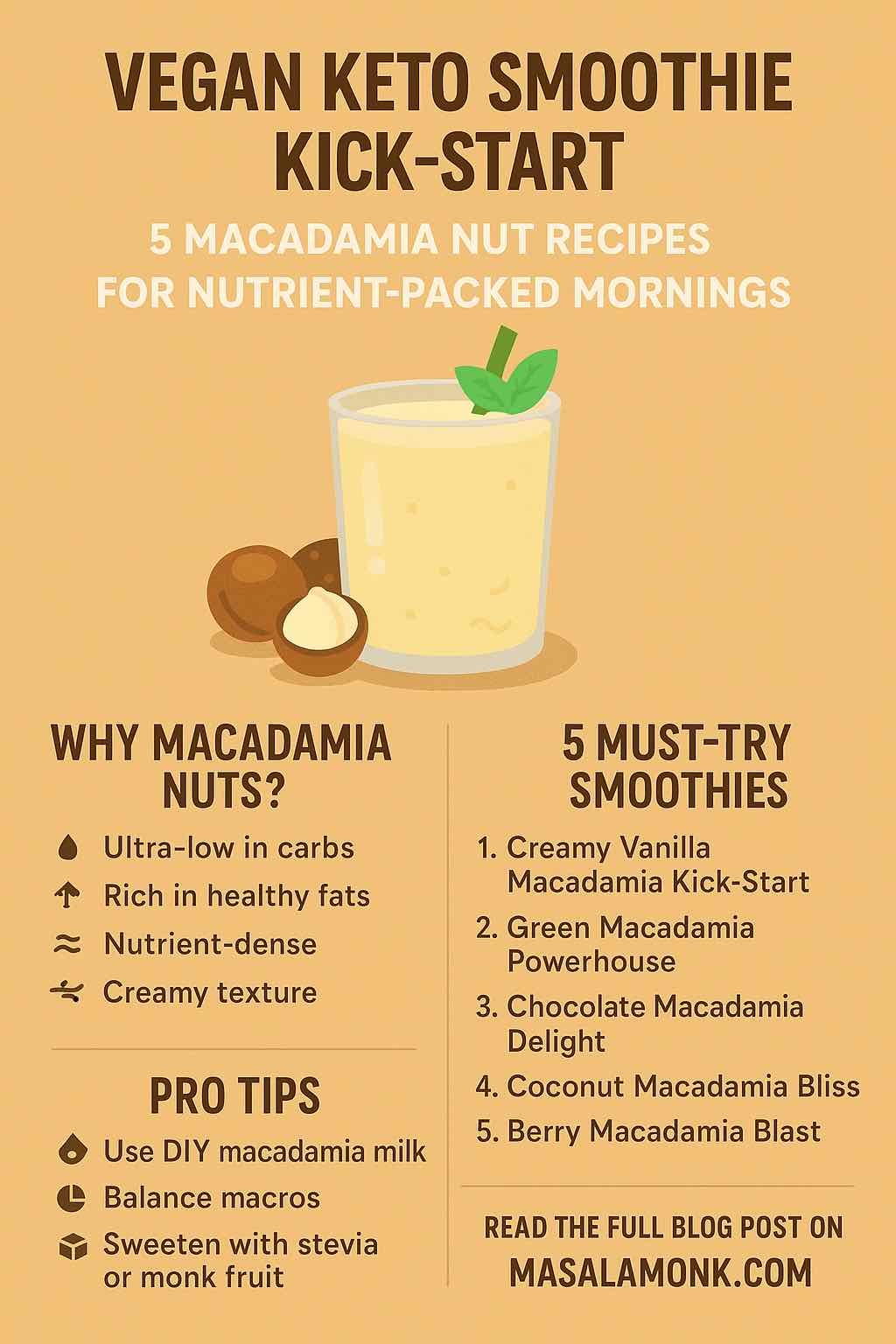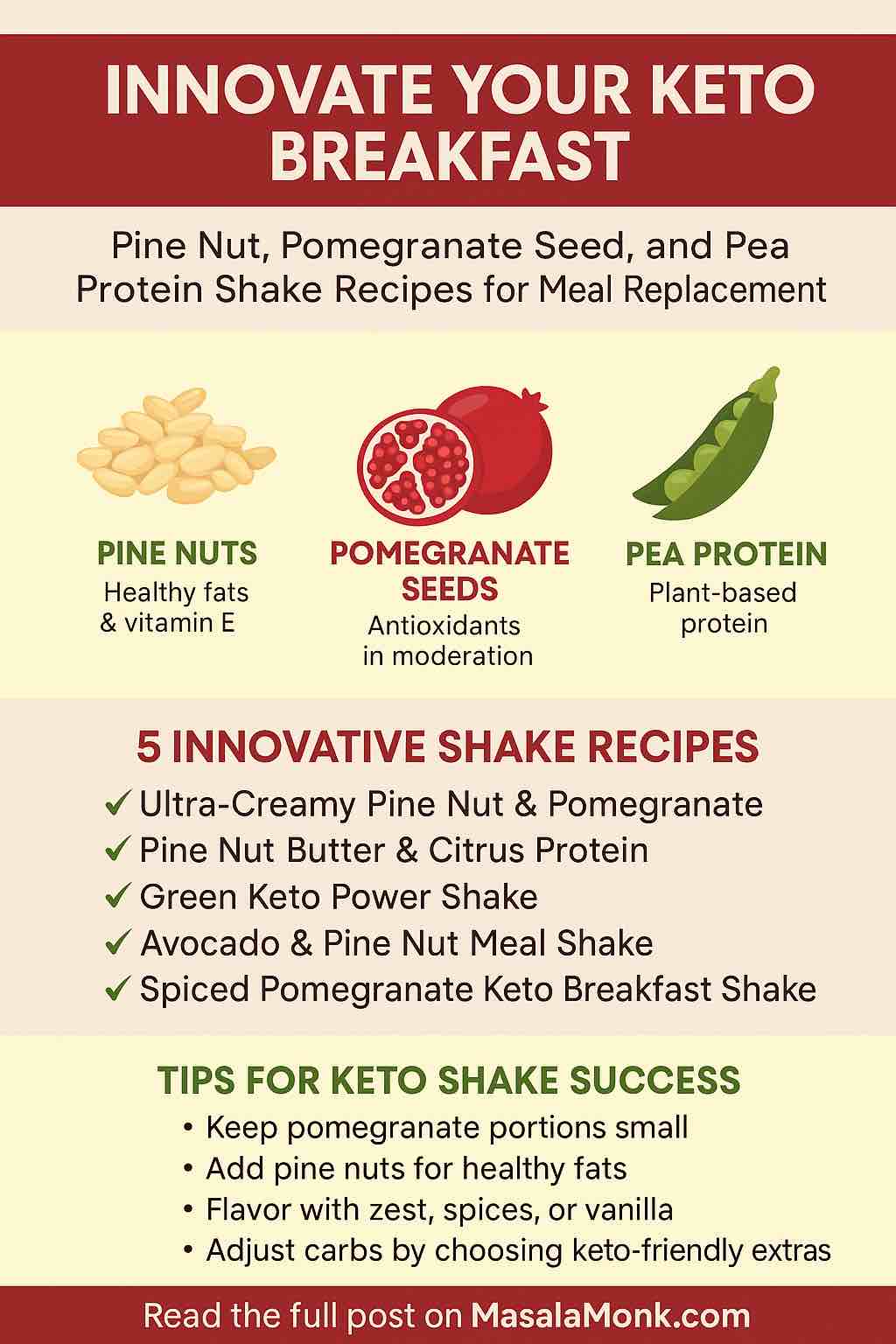
Are you tired of the same bacon and eggs every morning on keto? Looking for something plant-forward, fresh, and truly energizing—but still low in carbs and high in satiety? Let’s break the mold with keto meal-replacement shakes that bring together three powerhouse ingredients: pine nuts, pomegranate seeds, and pea protein.
These shakes aren’t just novel—they’re delicious, nutrient-dense, portable, and can be precisely customized to fit your macros. This post will walk you through why these ingredients are perfect for keto, how to combine them, and then give you five inventive, tested recipes (with pro tips and macro guides!) to make your mornings as satisfying as they are healthy.
Why These Ingredients?
Pine Nuts
Small but mighty, pine nuts are rich in healthy monounsaturated fats, vitamin E, magnesium, and plant sterols. Their creamy texture and subtly buttery taste add luxury to your morning, while their fat content supports ketosis and long-lasting fullness.
Pomegranate Seeds
While pomegranate isn’t typically “keto,” a tablespoon or two of the seeds offers a pop of color, antioxidants, and tart-sweet flavor with only a minor carb contribution. When used judiciously, they brighten your shake without breaking ketosis.
Pea Protein
Unlike dairy-based proteins, pea protein is plant-based, low in carbs, and suitable for most allergies. It has a neutral flavor, blends smoothly, and provides complete protein to keep you energized all morning.
The Art of Building a Keto Shake
- Base: Start with 1–1.5 cups unsweetened nut or seed milk (almond, coconut, macadamia, or even hemp milk).
- Protein: Add 1 scoop pea protein isolate (usually 18–22g protein, <2g net carbs per scoop).
- Fats: Include 1–2 tablespoons of pine nuts (or pine nut butter for extra creaminess).
- Flavor and Antioxidants: 1–2 tablespoons of pomegranate seeds—just enough for tang, color, and health benefits.
- Extras: Add spices, nut butter, avocado, or coconut cream for variety. Sweeten only if needed with monk fruit, stevia, or allulose.
Pro Tip: For a meal replacement, aim for ~20g protein, 20g fat, and <8g net carbs per serving.
5 Innovative Shake Recipes
Each recipe below is formulated for one generous serving, perfect as a stand-alone breakfast.
1. Ultra-Creamy Pine Nut & Pomegranate Morning Shake
Ingredients:
- 1.25 cups unsweetened almond milk
- 1 scoop vanilla pea protein
- 1 Tbsp pine nuts, finely ground
- 1 Tbsp pomegranate seeds
- 1 Tbsp chia seeds (optional, for fiber and texture)
- Ice cubes (to desired thickness)
- 1–2 tsp allulose or monk fruit sweetener (optional)
Directions:
- Add all ingredients except pomegranate to a blender.
- Blend until creamy and smooth.
- Stir in or sprinkle the pomegranate seeds on top before serving.
Macros: ~6g net carbs, 21g protein, 17g fat
Why you’ll love it: Silky and slightly tangy with bursts of juicy pomegranate—perfect for a refreshing start!
2. Pine Nut Butter & Citrus Protein Shake
Ingredients:
- 1 cup unsweetened vanilla almond milk
- 1 scoop unflavored or vanilla pea protein
- 1 Tbsp pine nut butter
- Zest of ½ lemon or lime
- 1 Tbsp pomegranate seeds (garnish)
- Sweetener to taste
- Ice
Directions:
- Blend all ingredients except pomegranate seeds.
- Pour into a glass and top with pomegranate seeds for color.
Macros: ~5g net carbs, 20g protein, 16g fat
Pro Tip: Pine nut butter adds a unique richness that’s both creamy and luxurious—try swapping the citrus zest for orange if you like a softer note.
3. Green Keto Power Shake with Pine Nuts & Pomegranate
Ingredients:
- 1.25 cups unsweetened nut milk
- 1 scoop pea protein
- ½ cup baby spinach or kale
- 1 Tbsp pine nuts, ground
- 1 Tbsp pomegranate seeds
- 1 tsp vanilla extract
- 1–2 tsp sweetener (optional)
- Ice
Directions:
- Blend all except pomegranate until smooth.
- Stir or layer in the seeds for a beautiful visual effect.
Macros: ~7g net carbs, 20g protein, 15g fat
Why you’ll love it: The greens add nutrients and color, but the pine nut and pomegranate balance the flavor beautifully.
4. Avocado & Pine Nut Keto Meal Replacement Shake
Ingredients:
- 1 cup unsweetened almond milk
- ¼ cup coconut cream or 2 Tbsp heavy cream
- ½ avocado
- 1 scoop pea protein
- 1 Tbsp ground pine nuts
- 1 Tbsp pomegranate seeds
- Sweetener to taste
- Ice
Directions:
- Combine everything but pomegranate in the blender and blend until creamy.
- Top with pomegranate seeds.
Macros: ~8g net carbs, 22g protein, 23g fat
Pro Tip: This is the most satiating shake on the list—great for days when you need to stay full for hours.
5. Spiced Pomegranate Keto Breakfast Shake
Ingredients:
- 1.25 cups nut milk (almond or coconut)
- 1 scoop pea protein
- 1 Tbsp pine nut butter or chopped pine nuts
- 1 Tbsp coconut cream
- Pinch of cinnamon and ginger
- 1 Tbsp pomegranate seeds (stirred in after blending)
- Ice
- Sweetener to taste
Directions:
- Blend everything except pomegranate.
- Stir seeds in or sprinkle on top.
Macros: ~6g net carbs, 20g protein, 18g fat
Why you’ll love it: Warm spices make this shake feel cozy and comforting—perfect for cool mornings.
Practical Tips for Shake Success
- Prep ahead: Pre-portion your dry ingredients in jars. Add milk and blend in the morning.
- Go portable: Use a shaker bottle if you don’t have time to blend—just shake extra hard and use pine nut butter instead of whole nuts.
- Customize: Adjust fat and protein to your needs by changing the amounts of pine nuts/cream and pea protein.
- Carb count: Pomegranate is the main carb contributor. Stick to 1–2 Tbsp seeds per shake for best results.
Conclusion: The Future of Keto Breakfast Is Here
Don’t settle for boring mornings! With these five shakes, you can start each day with something creamy, colorful, and deeply nourishing—while still supporting your keto goals. The combination of pine nuts, pomegranate, and pea protein is not only innovative but also easy to fit into any meal-prep plan.
Try one tomorrow—then make it your own!
Got a tweak, a favorite spice, or a new add-in? Share your version in the comments and let’s innovate together!
Ready to shake up your keto breakfast? Let’s make mornings exciting again—one pine nut, pomegranate, and pea protein shake at a time!
10 FAQs and Answers
1. Can I have these shakes every day on keto?
Yes. As long as you manage the carb content (mainly from pomegranate seeds and milk), these shakes can be enjoyed daily. They provide balanced macros for a meal replacement and keep you in ketosis if you stick to the portion sizes.
2. How can I further lower the carbs in these shakes?
Reduce or omit the pomegranate seeds, use unsweetened nut milks, and double-check your protein powder for hidden carbs. Adding more fat (like coconut cream or avocado) also improves satiety without raising carbs.
3. What are the benefits of using pea protein instead of whey or collagen?
Pea protein is plant-based, hypoallergenic, and low in carbs. It’s a great choice for vegans, those with dairy allergies, or anyone looking to avoid animal-based ingredients while still getting a complete amino acid profile.
4. Do pine nuts have any health concerns I should be aware of?
Pine nuts are generally healthy, but they are calorie-dense and contain moderate oxalates, so people with nut allergies or oxalate sensitivities should limit their intake or substitute with macadamia nuts or sunflower seeds.
5. Is it okay to prepare these shakes in advance?
Absolutely. Prepare and refrigerate them up to 24 hours ahead for best texture. For longer storage, keep the dry ingredients separate and blend with fresh liquid in the morning.
6. Can I swap out the pomegranate seeds for another keto-friendly fruit?
Yes. Use berries like raspberries or blackberries, which are lower in carbs. You can also try freeze-dried berry powder for flavor without extra carbs.
7. How do I make these shakes creamier?
Add avocado, coconut cream, or use nut butters. Blending longer and using ice also creates a thick, creamy texture. For extra smoothness, grind pine nuts before blending.
8. What sweeteners work best for these shakes?
Monk fruit, allulose, and stevia are all keto-friendly and won’t impact blood sugar. Taste and adjust, since some protein powders are already sweetened.
9. Are these shakes good for intermittent fasting?
Yes, if used as your “break-fast” meal. They provide balanced nutrition and are easy on the stomach, making them ideal for breaking a fast while staying low-carb.
10. Can I use these shakes for weight loss?
Definitely. These shakes are high in protein and healthy fats, which help control hunger and support muscle maintenance while reducing calories. Track your portions to align with your weight loss goals.

